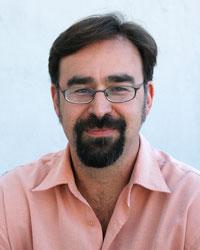Ignacio López-Calvo, Academic Senate Chair

The most significant topic for UC Merced's Academic Senate and the systemwide Academic Senate during the first weeks of the semester has been the UC presidential transition.
We are very proud that the new president of the University of California, Janet Napolitano, chose our campus as the first one to visit. The main purpose of her trip was to have a frank dialogue with members of the campus community and get to know UC Merced better so she can represent us appropriately when she speaks publicly.
After a tour of campus, she engaged in conversation with faculty members, students and staff members, which we hope helped her become familiar with our views, achievements, problems and dreams. She met with 25 faculty members who asked questions and commented on student and faculty diversity, support for the Presidential Post-doctorate Program, the faculty's service overload, the security of our undocumented students, the ratio of lecturers to ladder-rank faculty, our need to recruit more graduate students, online education, community outreach and the importance of the humanities, among other issues.
They also requested the economic support of the Office of the President and asked her to keep in mind the exceptional situation of UC Merced as a fledgling campus.
In preparation for her visit, our administrative leadership, along with the senate, prepared a briefing binder with a narrative about our campus to help her build her knowledge base. The following are three briefing statements the senate included:
- UC Merced is a story of success. Our campus opened in 2005 and, thanks to the resourcefulness and determination of its faculty and administration, it has experienced a rapid growth, with its current student population reaching 6180, 2100 of whom currently live on campus. UC Merced looks forward to support from the Office of the President and a commitment to the resources we need as we plan the next phase of growth and development, aiming to increase substantially the number of academic programs that are recognized around the world for their excellence.
- Much of the campus’ success can be attributed to our focus on both graduate and undergraduate interdisciplinary research. Despite the limitations in research infrastructure, the campus boasts a large number of faculty who have received the Presidential Young Investigator Awards, National Endowment for the Humanities, National Institute of Health, and National Science Foundation Awards, as well as a number of career awards. We have also been very successful with the acquisition of extramural funding through grants to support both undergraduate and graduate research. The presence of UC Merced has already had a positive impact on the region. Faculty research on local topics ranges from health disparities in the San Joaquin Valley to immigrant cultures and the Sierra snowpack. At the same time, our faculty members have the breadth of interest of any research university faculty, including, for example, work on climate change and solar energy.
- Our student demographics reflect the diversity of the San Joaquin Valley and California. We have the largest proportion of first-generation college students and our campus is also the most ethnically diverse in the University of California.
President Napolitano's visit was a great opportunity to make sure we gain her support for the 2020 Project and the new memorandum of understanding.
We worked diligently to make sure she returned to Oakland with the best possible first impression of our campus.
UC Merced's Academic Senate hopes this mission was accomplished. We are confident our new president will support our campus with the same passion as our previous president.
